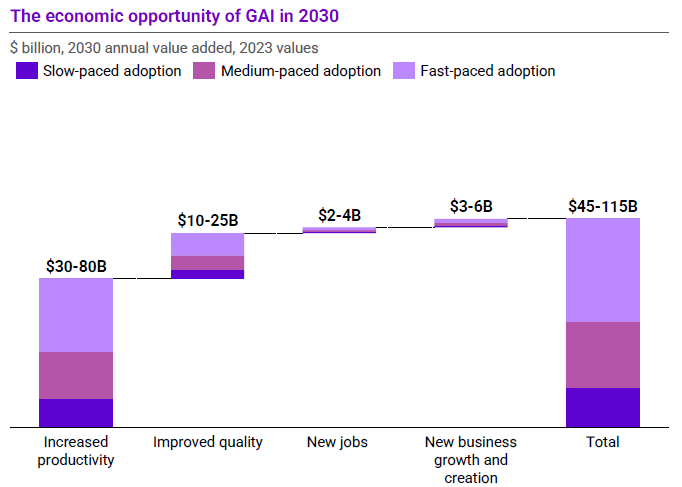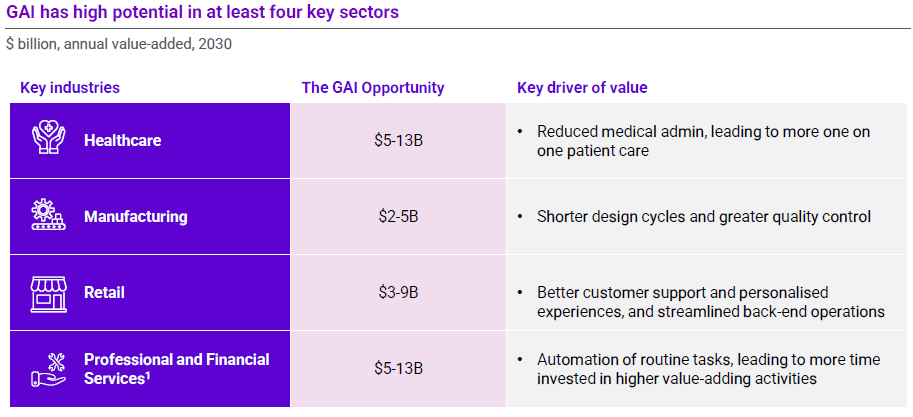
Leveraging the generative AI advantage to boost Australia’s economy. (Source – Shutterstock)
The AI advantage: How Australia can lead with generative AI
- Generative AI could add AU$115 billion annually to Australia’s economy by 2030.
- GAI can automate tasks, freeing professionals for complex work.
- Australia’s tech capabilities make it a potential global GAI leader.
With the advantage of Generative AI (GAI), numerous work sectors are gaining momentum. GAI empowers software developers to translate natural language into code, democratizing the process of coding. Researchers can exploit this AI advantage to disentangle complex problems and construct research frameworks. In management, the advantage of generative AI can be leveraged for functions such as producing training materials, pinpointing employee sentiment trends, and analyzing performance data.
A new report indicates that if Australia accelerates its responsible adoption of GAI, it could unlock billions in value for its professional and financial services sector by 2030. The report, titled ‘Australia’s Generative AI Opportunity,’ is a collaboration between Microsoft and the Tech Council of Australia. It estimates that by 2030, GAI could annually contribute between AU$45 billion and AU$115 billion to Australia’s economy. This would be achieved by improving existing industries and fostering the creation of new products and services.
The report earmarks professional and financial services as one of four key sectors in the Australian economy that could benefit from GAI. It estimates that GAI could annually contribute between AU$5 billion and AU$13 billion to this sector in Australia by 2030.

The economic opportunity of GAI in 2030. (Source – Microsoft and the Tech Council of Australia)
Unlocking the potential generative AI advantage for professional and financial services
The primary value proposition for GAI in the professional and financial services sector is its capacity to automate routine tasks, freeing up time for more high-value work. It could also elevate Australia’s reputation for exceptional knowledge workers and service delivery, especially within the legal and financial sectors.
Howard Silby, NAB Executive for Innovation and Partnerships, observes that while AI technology has been around for a while, there’s a notable uptick in Gen AI tools’ popularity and adoption.
Silby remarks, “Whilst we’ve been using AI tools for some time in areas including digital customer service, cyber security and financial crime, the opportunities for Gen AI to move our organization – and our industry – forward are significant. As a bank, it’s critical that we use AI for the benefit of our customers, and protecting their data has to be our first priority. That’s a key foundation for all the development around Gen AI that we put in place.”
The report suggests that GAI could automate 36% and assist in 26% of an accountant’s tasks, allowing them to transition to a more advisory and strategic role. For solicitors, GAI could automate 10% of their tasks and augment 32%, freeing up time for more complex legal issues.
GAI could also democratize access to professional services, such as legal and financial advice, for a broader Australian populace. It could help lawyers cater to more cases from underserved groups.
Sam Kidd, CEO and Co-founder at LawVu, states that its mission is to accelerate global legal work. By partnering with Microsoft, the company can securely incorporate AI enhancements into the LawVu legal workspace, helping legal teams save time to focus on more critical matters. This ultimately results in improved business outcomes.
Lee Hickin, Chief Technology Officer at Microsoft Australia and New Zealand, asserts that GAI has blossomed into a pivotal technology in 2023, with its adoption rapidly increasing across various Australian sectors.
“Microsoft is committed to fostering closer collaboration between industry and government to ensure the nation can realize the potential economic benefits of generative AI, and do so responsibly. Building trust in this technology is critical to harnessing its innovative capabilities and enabling Australia to become a global leader in this space,” Hickin added.
The report also highlights healthcare, manufacturing, and retail as other key sectors that could substantially benefit from GAI. It provides potential GAI use cases for these sectors and the possible economic value that could be generated from this technology.

Generative AI presents a significant opportunity for growth in the Australian economy. (Source – Microsoft and the Tech Council of Australia)
Australia’s preparedness for generative AI adoption
GAI is an emerging field full of potential, but it also brings significant uncertainties for those implementing and regulating it. Countries worldwide are taking measures to keep up with these advancements. For example, the US has established a Senate Judiciary Subcommittee on Privacy, Technology and the Law to consult with experts on the economic and societal impacts of GAI. Similarly, the EU is developing its primary AI legislation, the EU Artificial Intelligence Act, to classify and regulate AI.
Australia, in particular, is ready to align with global best practices. In 2019, the Federal Government launched an AI Ethics Framework to guide the responsible deployment of AI by businesses and the government. More recently, the CSIRO’s National AI Centre formed the Responsible AI Network (RAIN) to help the industry enhance AI governance capabilities.
Given Australia’s advantages in digital innovation, the nation is ideally positioned to become a leader in the GAI field; here are some of the reasons why:
- Talent pool: Australia boasts a flourishing tech workforce of 935,000 as of February 2023, projected to reach 1.2 million by 2030. This burgeoning workforce, with adequate support from industry and government, could serve as a sturdy base for GAI development and adoption.
- Digital infrastructure investment: Australia’s substantial investments in digital infrastructure, including plans for the NBN to offer high-speed internet access to 10 million households and businesses by 2025, pave the way for broader GAI benefits, particularly in regional areas.
- Market connections: Australia’s geographical location offers strategic access to expanding Asian markets, while its strong ties with the US, solidified by the AUKUS partnership, offer a robust platform for global GAI development collaborations.
- Policy support: The Australian Government is committed to being a global frontrunner in the creation and adoption of trusted, secure, and responsible AI, with up to $41m already pledged for responsible AI deployment in the economy.
The report, based on extensive economic analysis and consultations with industry, academia, and government, identifies four primary barriers to leveraging GAI: technology capability, enterprise readiness, awareness and skills, and responsible AI. It then proposes strategic actions for policymakers and adopters to overcome these obstacles and position Australia as a global GAI leader.
These actions include defining GAI’s opportunity and vision, assessing readiness, incentivizing adoption and innovation, upskilling the workforce, and creating responsible AI governance frameworks.
READ MORE
- The threat of fraud networks in the APAC: KYC and beyond
- Next-gen CX is based on customer communication management systems.
- Enhancing Business Agility with SASE: Insights for CIOs in APAC
- 3 Steps to Successfully Automate Copilot for Microsoft 365 Implementation
- Trustworthy AI – the Promise of Enterprise-Friendly Generative Machine Learning with Dell and NVIDIA


